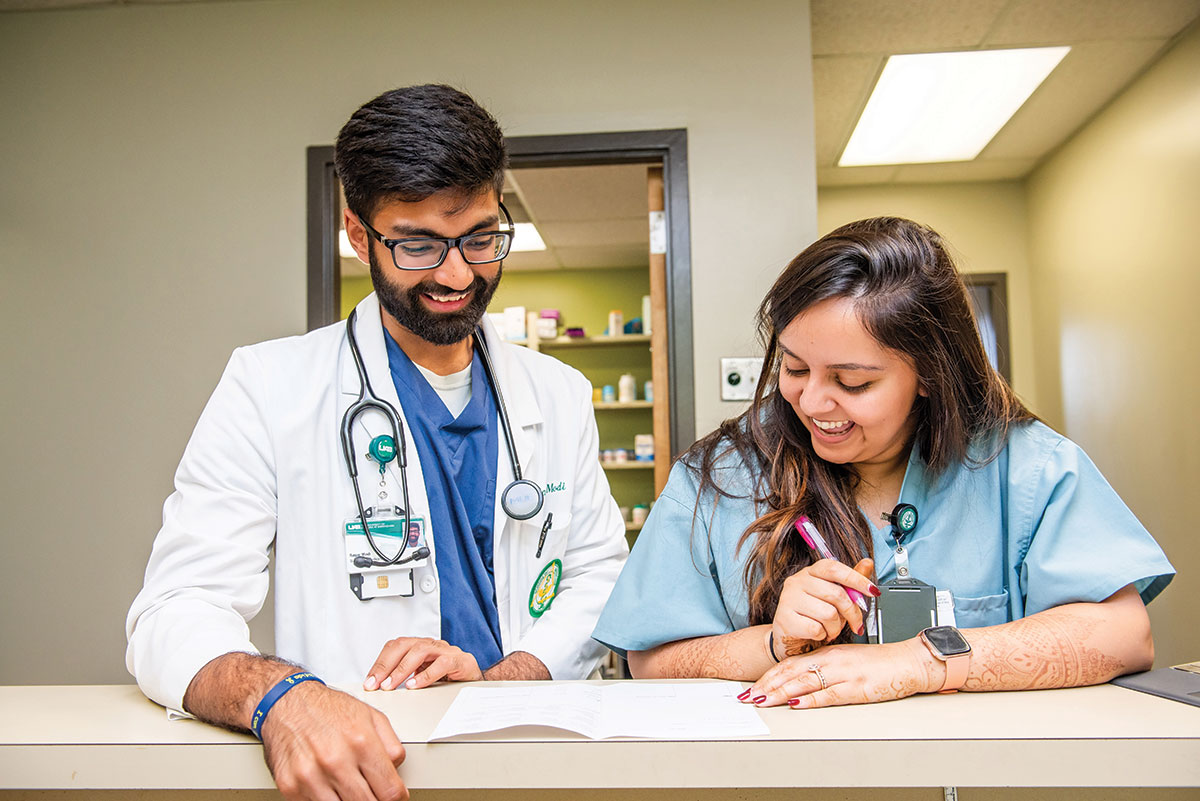Service Learning in the Curriculum
-
Year 1
Year 1
Fundamentals of Medicine – Cooking Demonstrations
After learning about nutrition in class, students have the opportunity to be instructed about how to craft nutritional advice for patients based upon common dietary challenges (e.g., too much sodium). Then students practice these skills at the East Lake Farmers Market, where they prepare a healthy recipe and teach healthy eating habits to the market attendees and farmers.
Cardiovascular – Writing an Exercise Prescription
After learning about cardiovascular health and exercise medicine, students have the opportunity to provide exercise counseling and education for patients at Cooper Green Mercy Hospital. This activity provides hands-on, real-world experience to further understand exercise content delivered during the CV module.
Pulmonary – Smoking Cessation Counseling
All students in the course learn how to “Assess, Advise, and Refer” patients who smoke towards quitting. Students who elect to participate in this service-learning experience are then trained on the fourth step: Assist. Through didactic training and mock patient scenarios, students learn how to assist patients. They then conduct smoking cessation counseling and distribute resources to community members at various social service agencies.
Renal – Nutrition and Dialysis Adherence Counseling
Students receive education on the process of patients undergoing dialysis for kidney disease, and then receive training on renal diets and motivational interviewing. They then go to one of our local dialysis centers to talk with patients undergoing dialysis about their diet and adhering to a regular dialysis schedule.
Clinical Skills (CRISP) - SHARPThis program provides CRISP students with a unique opportunity to interact with real patients in a longitudinal manner as it occurs in parallel with the rest of the CRISP curriculum. This program aims to help students develop fundamental skills for working in interprofessional (IP) teams and cultivate an appreciation for the successful implementation of IP care models in real patients. This occurs in a precepted, IP care setting while promoting students' development of their communication skills with patients and colleagues.
-
Year 2
Year 2
Neuroscience – Pediatric Vision Screenings
After learning about the anatomy of the eye, retina and visual pathways, and ophthalmology, students can opt to learn more about pediatric eye disorders from a School of Optometry professor. Afterwards, they conduct vision screenings with FocusFirst, to ensure that children in local Head Starts and other facilities receive the screening and follow-up care that is needed.
Musculoskeletal and Skin
We are in the process of developing a new experience… more to come!
Endocrine Systems – Nutrition Counseling for Diabetes
In addition to learning about the mechanisms of diabetes in the course, students can opt into more training about how to coach patients in preventing and managing diabetes in layman’s terms. Students then use motivational interviewing techniques to provide diabetes nutrition counseling to patients at Cooper Green.
Special Topics & Co-Enrolled Electives
Community Health Education
The purpose of this course is to increase knowledge about community health education, disparities in health and health care, explore attitudes and behaviors that promote and/or mitigate disparities in health literacy, and develop skills in culturally responsive care. The purpose of this session is to introduce core definitions and concepts related community health and basic recommended screenings for adults according to guidelines. Understand diagnosis criteria and therapeutic targets for common chronic diseases (i.e., HTN and DM), acquire skills and techniques to communicate, perform motivational interviewing and educate individuals about their health conditions.
EAB Clinical Skills
EAB Clinic Skills is for students who wish to learn important clinical skills required for clinical clerkships while simultaneously serving the Birmingham community. Students will work in the clinic seeing patients with a physician, be trained in how to draw labs in clinic, and write SOAP notes on the patients they see in clinic.
EAB Clinical Management
This course is only open to students who are EAB officers. Students will learn skills for success in their work at EAB, including how to plan and execute a quality improvement project as well as essential leadership skills in conflict resolution and time management.
Health Equity Scholars Immersion
This course is a requirement for students who are Health Equity Scholars in their MS3 year. The course will focus on social determinants of health and how to teach SDH to other medical students. The course will employ case studies and require students to develop their own case study, as well as to teach peers in a small group format. Students will also practice and refine their skills in motivational interviewing, and will do smoking cessation counseling at community sites. After completion of this course, students will be prepared to function as teaching assistants for all service learning courses.
Summer Camps
- Camp Seale Harris
- Camp Seale Harris is a summer camp for kids ages 6-11 with diabetes. Students will join the campers in classic outdoor activities like swimming and archery, but will also learn the basics of blood sugar management and gain experience in teaching children about blood glucose monitoring.
- Camp Smile-A-Mile
- Camp Smile-A-Mile provides year-round challenging, unforgettable recreational and educational experiences for young cancer patients, their families, and young adult survivors. The week-long camp is for on-therapy and off-therapy patients ages 13 through 10th grade.
- Camp Rapahope
- Rapahope is a non-profit camp for children with cancer which provides a one week, life changing experience for children who have, or have had, cancer.
- Camp Anytown
- Anytown gives students the chance to participate in honest dialogue and interactive learning about social justice issues, while canoeing, hiking, fishing, and more. The goal is for students to learn how to respond to difficult real-life situations with kindness, courage and respect.
If you are interested in designing your own personalized service learning Special Topic, contact the Office of Service Learning to discuss.
- Camp Seale Harris
